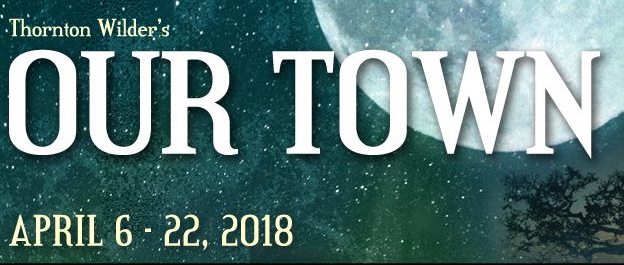American playwright Thornton Wilder won a Pulitzer Prize for his finely-tuned masterpiece, Our Town. First produced in 1938—on a stage completely bare save for some chairs, two tables, and two ladders—it reveals the gritty, glorious, fuzzy reality of what Edmund Husserl called “lived time.” Not the expansive, beginning-middle-end time of fiction or daydreams. But the mundane, emotionally-troubled, worn time of everyday. The lived time that goes by so barely noticed that we, at least those of us over the age of 40, often find ourselves wondering out loud, “where does the time go?”
Thanks to skilled theater professional Suzanne Sturn, the culturati of Santa Cruz have a chance to remember just how true, unflinching, and humbling Our Town remains. Though most of the people in the opening week’s audiences had very likely seen or read the play in their high school years—like good wine, or almost anything by Shakespeare, this play just gets better, and more disturbingly beautiful with time.
Sturn herself plays the loquacious Stage Manager, the person who introduces the audience to the play, the town—Grovers Corners, New Hampshire—and the era, very early 20th century. With pitch perfect and insider wisdom, Sturn’s Stage Manager introduces us to the key residents of the town, the two families who will be joined together upon the marriage of one son George (Maxwell Bjork), and one daughter (Isabel Cruz). With unerring economy—gestures and vocal work do most of the heavy lifting in this production—Sturn moves the residents of Grovers Corners from early morning, to work and school, home again, and then long into the night.
We meet the milkman Howie Newsome (Chris Rich), the town doctor Dr. Gibbs (Dennis Hungridge), Mrs Gibbs (Susan Forrest) who is Emily’s mother, the town newspaper editor Mr. Webb (Bob Colter), and Mrs. Webb (a terrific Gail Borkowski) who is George’s mom. Everything moves smoothly, almost dreamily from the time when the young people are first discovering each other. The middle section of the play, “Love and Marriage,” deepens the awakening of human needs and desires, and introduces a few more delicious players, the town’s hard-drinking choir mistress (played by Mindy Pedlar), and jolly, philosophical Mrs. Soames (Hannah Eckstein).
In their New World Romeo and Juliet roles, courting each other from the tops of ladders, George and Emily unpeel the pain and awkwardness of youth just managing to reach something like agreement about a future together. It is so familiar, so unexpectedly new, so sparingly written, with absolutely not one word too many. Wilder is a humbling precedent for any emerging playwright.
And the final scene, at the town’s cemetery, delivers everything we know is coming. And yet we’re never quite ready for the last scene of Our Town. Sturn’s production utilizes space and time wisely. The players move up and down the aisles of the tiny theater, bringing their hopes, and ours, with them across the thresholds of mortality and whatever might lie beyond.
“Do any human beings ever realize life while they live it?” Emily asks, speaking for everyone who’s ever lived.
If there is anyone who might, against all odds, not know how the play unfolds, I won’t dwell on the final 30 minutes. It’s a surprise worth getting dressed for. But as I watched the play again, struggling for composure, I found myself watching it through my recent reading of George Saunders’ (another Pulitzer Prize winner) Lincoln in the Bardo. Somehow Wilder and Saunders each understood the Buddhist concept of mindfulness, and the need for those of us alive to be released by those we have loved, and lost. The thin, but ultimate membrane that separates life, death, and eternity.
The play itself is better than I could ever have hoped, or remembered. And this production does it justice, making all the right calls in terms of staging and timing. Kudos to the entire cast and director. Thornton Wilder’s Our Town plays at the Center Stage Theater, 1001 Center St., Santa Cruz through April 22. Rife with the magic of an imagined domain that only live theater can realize, this is a production worth two hours and 15 minutes of your time. And then some. Tickets here.


